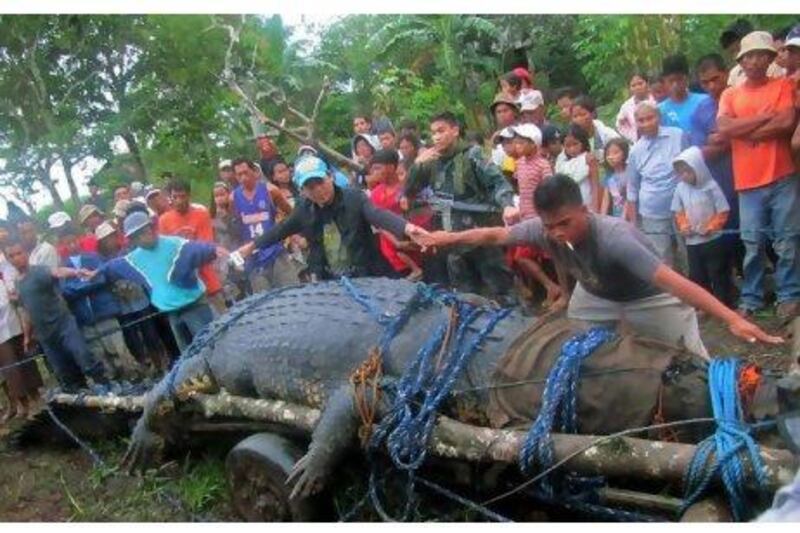MANILA // Relieved Filipinos have captured a one-ton crocodile that had terrorised their village.
About 100 people pulled the beast from a creek by rope then hoisted it by crane onto a lorry.
But the party may have been premature. After the 6.4 metre saltwater crocodile was caught over the weekend, authorities said yesterday an even bigger killer may lurk in creeks of the remote region.
The crocodile - weighing 1,075 kilograms and at least 50 years old - is the biggest caught alive in the Philippines in recent years.
Wildlife officials were trying to confirm whether it was the largest such catch in the world, said Theresa Mundita Lim of the government's Protected Areas and Wildlife Bureau.
It was captured after a three-week hunt in Bunawan township in Agusan del Sur province.
A child was killed two years ago in the township, home to about 37,000 people, by a crocodile that was not caught. A croc is also suspected of killing a fisherman missing since July.
Bunawan villagers celebrated after they caught the crocodile. "It was like a feast, so many villagers turned up," Mayor Edwin Cox Elorde said.
Wildlife official Ronnie Sumiller, who has hunted "nuisance crocodiles" for 20 years and led the hunt team in Bunawan, about 830 kilometres south-east of Manila, said a search was under way for a possibly larger crocodile.
"There is a bigger one and it could be the one creating problems," Mr Sumiller said. "The villagers were saying 10 per cent of their fear was gone because of the first capture but there is still the other 90 per cent to take care of."
Backed by five village hunters he has trained, Mr Sumiller has set 20 steel cable traps with an animal carcass as bait along the creek where the first croc was caught and in a nearby marshland.
Mr Sumiller found no human remains when he induced the captured crocodile to vomit.
Guinness World Records lists a saltwater crocodile caught in Australia as the largest crocodile in captivity, measuring 5.48m.
Mayor Elorde plans to make the crocodile "the biggest star" in an eco-tourism park to be built to increase awareness of villagers and potential tourists of the vital role the reptiles play in the ecosystem.
Philippine laws strictly prohibit civilians from killing endangered crocodiles - the penalty is up to 12 years in prison and a fine of US$24,000 (Dh88,000).
The country's environment secretary Ramon Paje said the crocodile was captured because it was a threat.
Crocodiles have been hunted by poachers hoping to cash in on the high demand in wealthy Asian countries for their skin, which is coveted for products such as bags.





